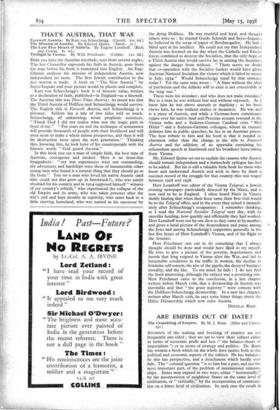THAT'S AUSTRIA, THAT WAS
The Last Five Hours of Austria. By Eugene Lennhoff. (Rich and Cowan. 8s. 6d.)
Twilight in Vienna. By Will Frischauer. (Collins. 12s. 6d.)- HERE you have the Austrian interlude, seen from several angles.:- The last Chancellor expounds his faith in Austria, gone from the map before his book is translated into English. -: _ An Eng lishman analyses the mission of independent Austria, now independent no more. The first Jewish contribution to the post mortem is made. A book on " The New Austria " by Seyss-Inquart and your picture would be plastic and complete, Kurt von Schuschnigg's book is of historic value, written as a declaration of faith, published—in England-7as a farewell. The Austrian title was Three Times Austria ; its moral was that the Third Austria of Dollfuss and Schuschnigg would survive.- The English title is Farewell Austria, and Schuschnigg is a prisoner. Seldom has a tale of two titles told so much.' Schuschnigg, all unknowing, wrote prophetic sentences. " Thank God I did not realise what was the tragic path in front of me." " For years on end the technique of armaments Will provide thousands of people with -their livelihood and will. even seem to make a whole nation prosperous, and then it will let destruction loose upon the next generation." Thinking this, knowing this, he took leave of his countrypeople with the historic words " God guard Austria."
In this book you see a man of simple faith, the best type of Austrian, courageous and modest. Here is no front-line braggadocio : " my war experiences were not outstanding, My adventures and hardships were those of innumerable other- young men who found it a natural thing that they should go to the front." You see a man who loved his native Austria (and- Who could not that grew up in Innsbruck?), who was sorely. troubled for his country and in 1914 supposed himself " witness of my country's rebirth," who experienced the collapse of the Old Empire and its army, who was taken prisoner after the war's end and kept months in captivity, who came back to a' little starving homeland, who was named as his successor by- the _dying Dollfuss. He was _truthful and loyal, and thought others were so : he trusted Guido Schmidt and Seyss-Inquart, lie believed in the scrap of paper of Berchtesgaden. He had a blind spot in his intellect. He could not see that Independent Austria was doomed on the day when the Catholic and Fascist forces combined to destroy the Socialists, that the only hope of a Third Austria that would survive lay in uniting the Austrians against the danger from without. " There seems no doubt that co-operation with the Socialist leaders would have given Austrian National Socialism the victory which it failed to secure in July, 1934." Would Schuschnigg stand by that sentence today ? Yet the same man wrote : "A State without the ideal of patriotism and the definite will to exist is not conceivable in the long run."
These were his mistakes; and who does not make mistakes? But as a man he was without fear and without reproach. As I knew him he was above untruth or duplicity ; as his book shows him, he Was without malice or meanness. He was and is a piece of Austria, and while a German-born commissary reigns over his native land and Prussian accents resound in the Vienna radio and a Sudeten-German Cardinal cries " Heil Hitler " and a Sudeten-German colleague, whom he trusted, defames him in public speeches, he lies in an Austrian prison.
The best tribute to him and his book is that it needed no alteration other than the change in the title to Farewell Austria and the addition of an appendix containing his referendum speech at Innsbruck and his broadcast leave-taking from Vienna. - Mr. Edward Quinn set out to explain the reasons why Austria should remain independent and a melancholy epilogue has had to be added. But his is still a valuable little book for those who know and understand Austria and wish to have by them a succinct record of the struggle for that country that was waged between 1918 and 1938.
Herr Lennhoff was editor of the Vienna Telegraf, a Jewish evening newspaper particularly detested by the Nazis, and is now said to be in England. I often heard Nazis in Vienna darkly hinting that when their hour came their first visit would be to the Telegraf office, and in the event they seized it immedi- ately after Schuschnigg's resignation : I remember thinking; as I read the National Socialist Telegraf next day, with its swastika heading, how quickly and efficiently they had worked: Herr Lennhoff went out by one door as they came in by another, and gives a lurid picture of the despondency and panic among the Jews and among Schuschnigg's supporters generally in the last five hours of Herr Lennhoff's Vienna, and of his flight to the frontier.
Herr Frischauer sets out to do something that I always thought should be done and would have liked to try myself.
He tries to give a picture of the poverty, hopelessness and inertia that long reigned in Vienna after the War, and led to lamentable conditions in the traffic in women, the decline in feminine self-esteem, the rise of the gigolo, the decay of business morality, and the like. To my mind he fails : I do not find the book interesting, although the subject was a promising one. Herr Frischauer came to the conclusion, in a last chapter written before March Izth, that a dictatorship in Austria was inevitable and that " the great majority " were content with the Dollfuss-Schuschnigg dictatorship. In a new last chapter, written after March 12th, he says some bitter things about the Hitler Dictatorship which now rules Austria.
DOUGLAS REED.














































 Previous page
Previous page